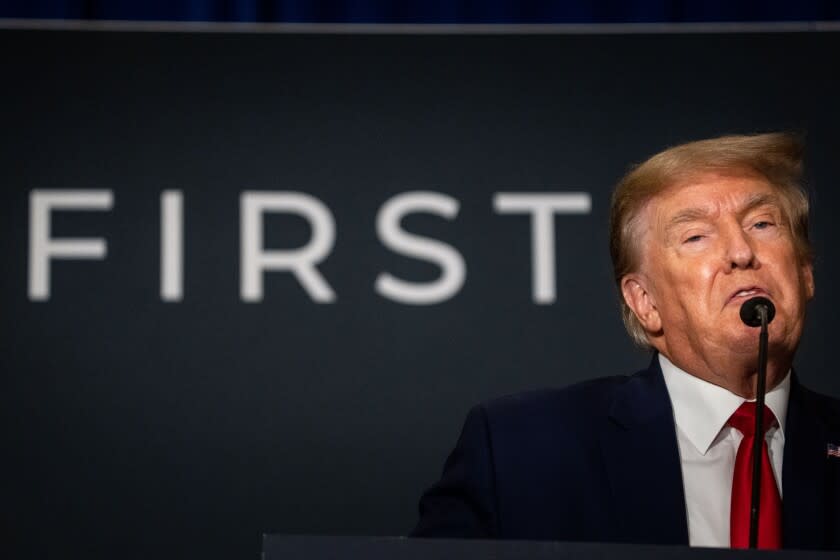Op-Ed: Here's one factor that might peel Trump's diehard supporters away

- Oops!Something went wrong.Please try again later.
- Oops!Something went wrong.Please try again later.
As some recent surveys suggest, Donald Trump is vulnerable in the 2024 Republican nomination contest, and could face significant competition from Florida Gov. Ron DeSantis. Still, the former president remains the favorite and is fervently loved by many Republican voters.
But even if Republicans like him, what might make them vote for someone else in the 2024 primaries?
We explored this issue in a survey experiment by focusing on Trump’s perceived “electability.” That is, we wanted to understand if there were Republicans who like Trump but are concerned that he might not be the strongest nominee to put up against Joe Biden or another Democratic nominee in 2024.
Electability is a slippery concept because a person voters think can win an election is difficult to separate from the candidate they would prefer to be victorious. Trying to assess this distinction requires voters to think more deeply about candidates than they are typically asked to do.
The idea of electability assumes that some candidates will have an easier time in a general election than others, and that this advantage is knowable at the time a nomination decision is being made. It’s hard to test this. If the 2020 presidential election had been between, say, Chris Christie and Elizabeth Warren instead of Trump and Biden, it’s conceivable that Republicans might have retained the White House, but we can’t know that alternate result. Yet many political experts and voters consider concepts of electability when making choices about nominees.
To test this, we surveyed hundreds of Republican voters and asked them two key questions: 1) Whom do you want to see as the Republican presidential nominee in 2024? and 2) Whom would you make president today if you had a magic wand? This allowed the survey respondents to distinguish between the person they wanted to win and the person they thought could win. The difference between those two, theoretically, is electability. (This approach has been used in previous presidential election cycles.)
There were 208 Republicans in our control group. Some 49% of them said they would wave a magic wand to make Trump president. However, only 44% said they’d like to see him as the nominee. This is a modest, though statistically significant, difference. Those who wanted Trump to be president but did not want him as the nominee were largely split among several different candidates as their preferred nominee, with the plurality favoring DeSantis. Although Trump is still the dominant candidate, he is vulnerable in the sense that some of his supporters do not think he can win.
We also wanted to see if different types of news coverage about Trump could widen or shrink this electability gap. In our experiment, we set up several different conditions, with participants divided up randomly into groups of roughly 200 people. We showed each group a different version of a fictitious news story — one that praised Trump for his work in office in 2020, one that was critical of it, and one that was neutral. We also labeled the stories as coming from either Politico or Breitbart. We tested those particular media outlets in a previous survey and found that respondents recognized them as neutral and conservative-leaning, respectively. The control group didn’t see any news story. (We debriefed the subjects later to inform them that the news story was fabricated for academic research only.)
The results were particularly interesting when people in one of the experimental conditions saw an article from Breitbart criticizing Trump’s job performance. After reading that, some 45% of respondents said they would wave a wand to make Trump president, but just 35% wanted him to be the GOP nominee. What was a 5-point electability gap in the control condition turned out to be a 10-point gap in this one. The beneficiary of this experiment was overwhelmingly DeSantis.
While Trump beats DeSantis in the magic wand contest 45% to 21%, his advantage over DeSantis in terms of the nomination is far narrower — 35% to 28%. The intervention — a conservative publication expressing concerns about Trump — turned a coronation into an actual contest. This should be a serious worry for Trump.
Of course, this is only an experiment. The real world is far more complex. But it suggests that even Republicans who are strong supporters of Trump are open to arguments about his ability to win elections, and those supporters seem to see DeSantis as a real option, at least right now.
The last few months have brought some particularly tough scrutiny on Trump, not the least of which are the revelations from the House Jan. 6 Committee. What’s more, some recent polling shows that even while Biden is pretty unpopular, he probably would still beat Trump in another matchup. Republicans are surely considering these factors as they ponder their choices for 2024.
Seth Masket is a professor of political science and director of the Center on American Politics at the University of Denver. Christopher Celaya is a postdoctoral researcher at the center.
This story originally appeared in Los Angeles Times.

